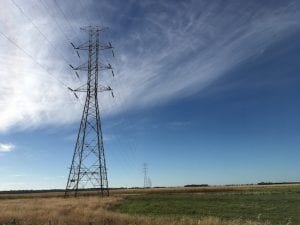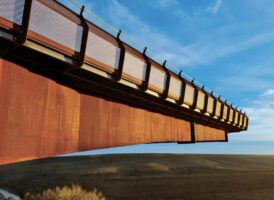Australia must phase out oil, gas and coal to rapidly transition to renewable energy in a way that protects the environment – that is the core message the Australian Conservation Foundation and the World Wide Fund for Nature – Australia are bringing to the third week of the federal election campaign.
On Monday, the two groups published a jointly-authored plan for how to get there that calls for a fundamental shift in regulation, business practices and approach that is needed to ensure a transition to a clean economy that combats climate change, protects nature and balances the needs of First Nations people and local communities.
The detailed document, Our Renewable Future, was released in time for the third week of the election, and partly in response to campaigns against renewables developments and the emergence of sock-puppet campaign groups backed by industry to advocate for fossil fuels.
The environmental groups want companies working in renewables to take more care about where they site their projects and ensure buy-in from First Nations peoples and local communities, warning that corner cutting will be used against them.
“One bad project can ruin it for everybody, threatening community support, damaging the environment, and empowering the fossil fuel lobby,” they say.
The groups want buffer zones and “no-go” areas to be created near high-value conservation areas to help project developers quickly assess where they should or should not site a project.
They also make clear Australia has to move quickly to achieve its targets under the Paris Agreement that requires a phase out of coal and gas from the entire Australian economy by 2035.
It would take up to 2,000 square kilometres, or just 0.0002 per cent of the Australian landmass, to meet the country’s energy needs with renewables – a marginal amount compared to agriculture which uses 55% of the Australia.
Building out enough renewable energy to power Australia would require another another 10,000km of power lines to be built on top of 790,000kms.
CEO Australian Conservation Foundation Kelly O’Shanassy said “there is an attack on renewables in Australia” underway where isolated mistakes by one developer or government department were being exploited by bad faith actors to challenge the legitimacy of climate action.
“The alternative is delaying renewables and keeping coal and gas in the system, which will damage nature and drive extinction,” O’Shanassy said. “There’s so many blatant lies that it’s really confusing Australians.”
O’Shanassy also singled out the government’s record on its Nature Positive reforms and last-minute amendments to Australia’s “toothless” environmental laws as a matter of concern.
Before the election was called, one of the last acts of parliament by the Labor government was to pass amendments in the House of Representatives that it said were to protect the Tasmanian salmon industry.
Environment and climate groups have responded with fury at the last-minute changes to Australia’s environmental laws to favour industry over science, warning that the changes guarantee the extinction of the Maughan skate but will also stop challenges to oil and gas projects.
Anger among major climate and environment groups was so strong, an emergency meeting was called where the groups decided to pull ads attacking the Coalition over nuclear energy and redirect them towards criticism of Labor over its environmental record.
O’Shanassy said ACF met with Albanese last week alongside other environmental groups about the state of Australia’s environment laws and was told the PM believed the reforms “were important and important to do quickly in the next term if they are re-elected”.
“The Albanese government has been good on renewables, bad on coal and gas. In one way they’ve been quite good for our domestic energy transition but missing in action on our coal and gas exports. The one exception is Future Made in Australia.
“As we said to the PM, you have committed to a Future Made in Australia, you want to transition our economy to net zero. You can’t do that without reforming these laws; you have to protect nature as you do that work because nature is such a vital part of that work.
“We cannot address climate change without protecting nature.”
O’Shanassy said the groups were looking for “all major parties that could form government to commit to phasing out oil, gas and coal” saying the window for action was rapidly closing.
“If we do not fix climate change, and we do not protect habitat, we will not have koalas. Very simple,” she said.
“It’s renewables or extinction, basically. And it won’t just be wildlife. If we do not solve the climate problem it’s an existential threat to humans.”








